Papers written by Hodgkin, Ernest P. (Doctor, b.1908 - d.1998) - Part 5
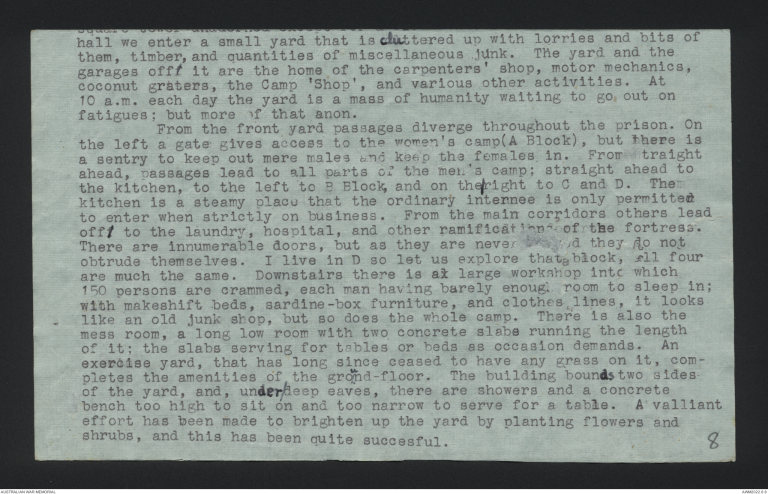
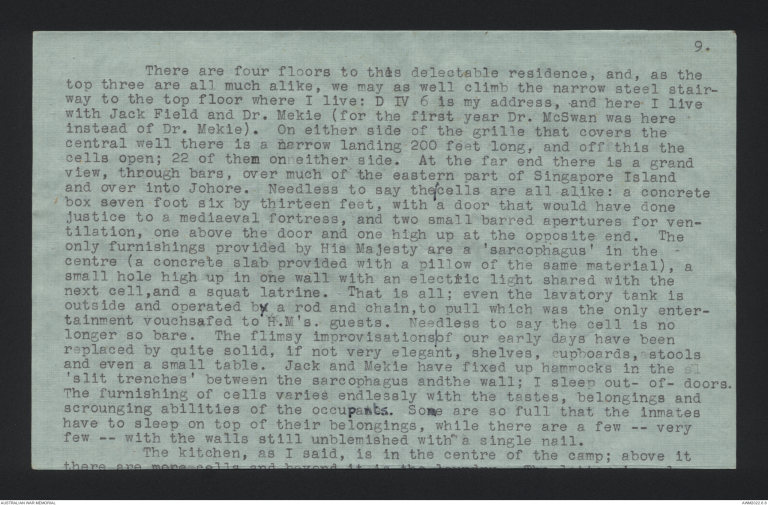
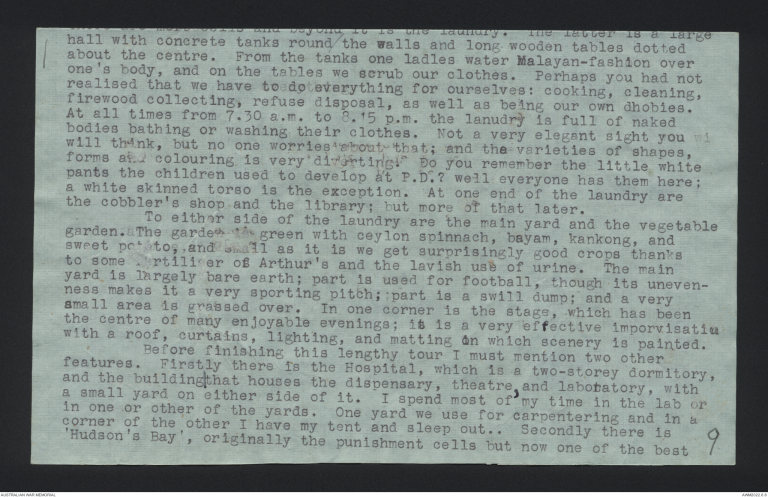
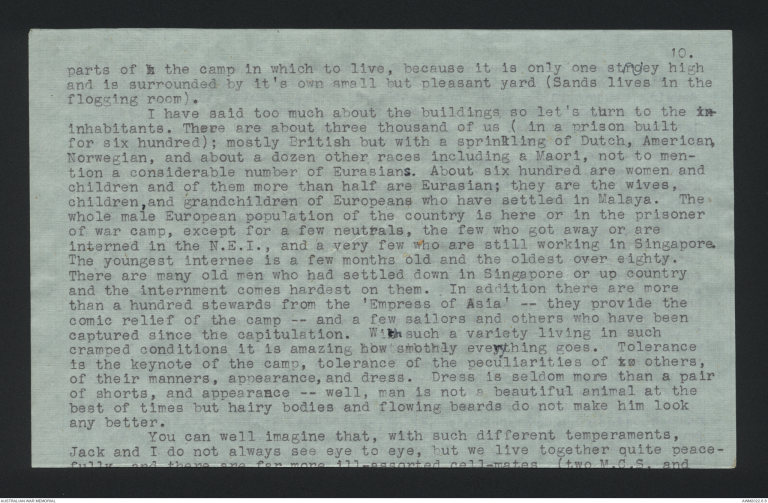
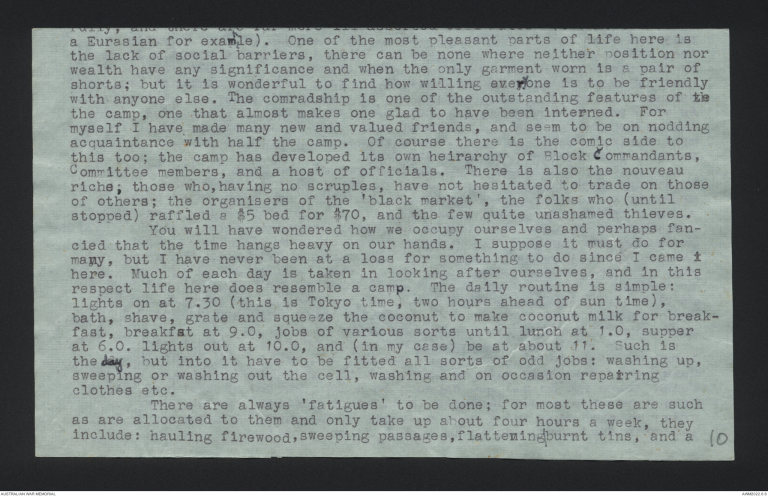
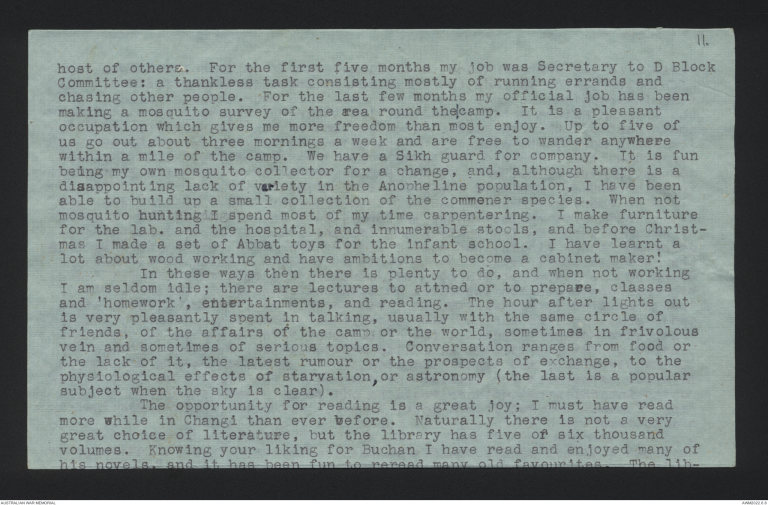
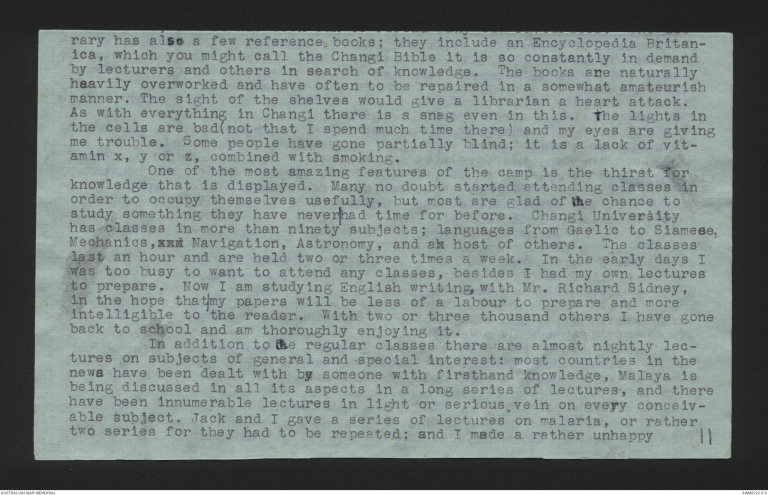
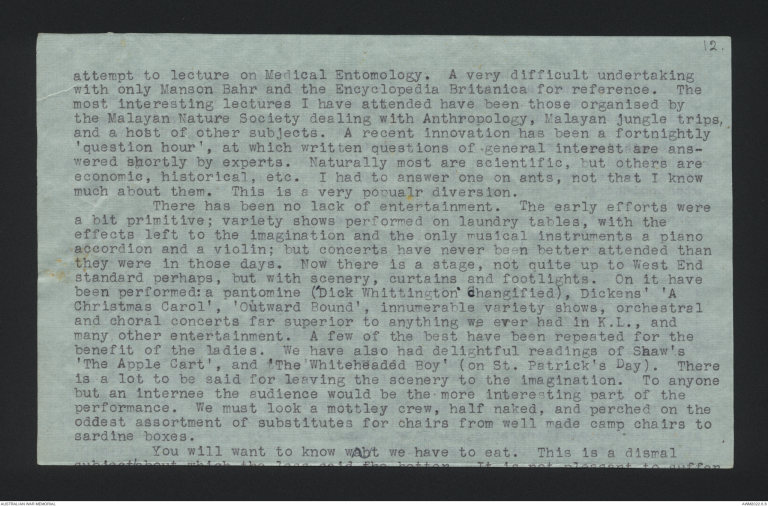
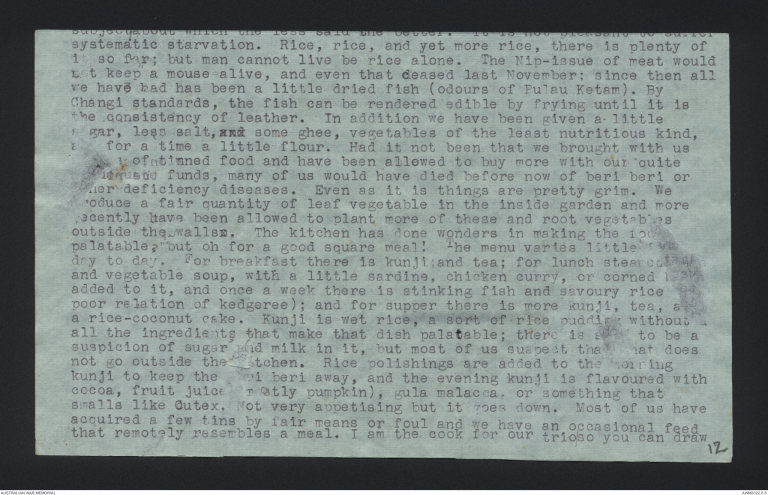
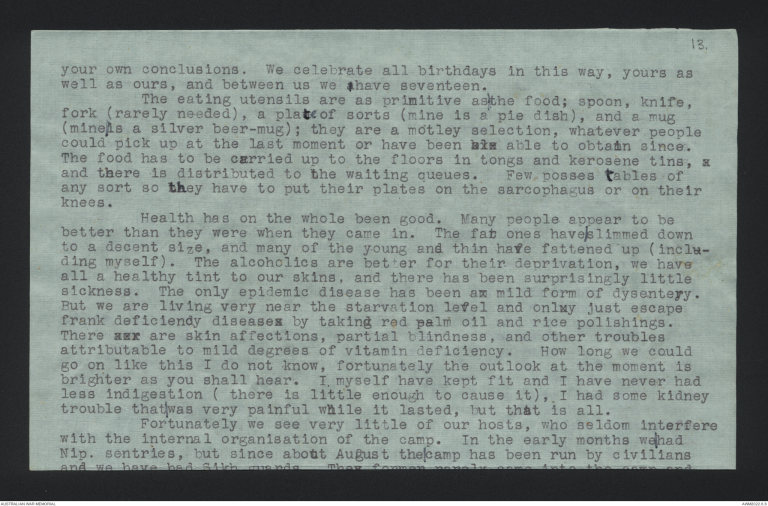
hall we enter a small yard that is cluttered up with lorries and bits of
them, timber, and quantities of miscellaneous junk. The yard and the
garages offf it are the home of the carpenters' shop, motor mechanics,
coconut graters, the Camp 'Shop', and various other activities. At
10 a.m. each day the yards is a mass of humanity waiting to go out on
fatigues; but more of that anon.
From the front yard passages diverge throughout the prison. On
the left a gate gives access to the women's camp(A Block), but there is
a sentry to keep out mere males and keep the females in. From traight
ahead, passages lead to all parts of the men's camp; straight ahead to
the kitchen, to the left to B Block, and on the/right to C and D. The
kitchen is a steamy place that the ordinary internee is only permitted
to enter when strictly on business. From the main corridors others lead
offf to the laundry, hospital, and other ramifications of the fortress.
There are innumerable doors, but as they are never [[?d]] they do not
obtrude themselves. I live in D so let us explore that block, all four
are much the same. Downstairs there is ax large workshop into which
150 persons are crammed, each man having barely enough room to sleep in;
with makeshift beds, sardine-box furniture, and clothes lines, it looks
like an old junk shop, but so does the whole camp. There is also the
mess room, a long low room with two concrete slabs running the length
of it: the slabs serving for tables or beds as occasion demands. An
exercise yard, that has long since ceased to have any grass on it, completes
the amenities of the ground-floor. The building bounds two sides
of the yard, and, under/deep eaves, there are showers and a concrete
bench too high to sit on and too narrow to serve for a table. A valliant
effort has been made to brighten up the yard by planting flowers and
shrubs, and this has been quite succesful.
[*8*]
9.
There are four floors to this delectable residence, and, as the
top three are all much alike, we may as well climb the narrow steel
stairway to the top floor where I live: D IV 6 is my address, and here I live
with Jack Field and Dr. Mekie (for the first year Dr. McSwan was here
instead of Dr. Mekie). On either side of the grille that covers the
central well there is a narrow landing 200 feet long, and off this the
cells open; 22 of them on either side. At the far end there is a grand
view, through bars, over much of the eastern part of Singapore Island
and over into Johore. Needless to say the/cells are all alike: a concrete
box seven foot six by thirteen feet, with a door that would have done
justice to a mediaeval fortress, and two small barred apertures for ventilation,
one above the door and one high up at the opposite end. The
only furnishings provided by His Majesty are a 'sarcophagus' in the
centre (a concrete slab provided with a pillow of the same material), a
small hole high up in one wall with an electric light shared with the
next cell, and a squat latrine. That is all; even the lavatory tank is
outside and operated by a rod and chain, to pull which was the only
entertainment vouchsafed to H.M's. guests. Needless to say the cell is no
longer so bare. The flimsy improvisations/of our early days have been
replaced by quite solid, if not very elegant, shelves, cupboards, stools
and even a small table. Jack and Mekie have fixed up hammocks in the
'slit trenches' between the sarcophagus andthe wall; I sleep out- of- doors.
The furnishing of cells varies endlessly with the tastes, belongings and
scrounging abilities of the occupants. Some are so full that the inmates
have to sleep on top of their belongings, while there are a few - - very
few - - with the walls still unblemished with a single nail.
The kitchen, as I said, is in the centre of the camp; above it
there are more cells and beyond it
is the laundry. The latter is a large
hall with concrete tanks round the walls and long wooden tables dotted
about the centre. From the tanks one ladles water Malayan-fashion over
one's body, and on the tables we scrub our clothes. Perhaps you had not
realised that we have to do everything for ourselves: cooking, cleaning,
firewood collecting, refuse disposal, as well as being our own dhobies.
At all times from 7.30 a.m. to 8.15 p.m. the lanudry is full of naked
bodies bathing or washing their clothes. Not a very elegant sight you
will think, but no one worries about that; and the varieties of shapes,
forms and colouring is very diverting. Do you remember the little white
pants the children used to develop at P.D.? well everyone has them here;
a white skinned torso is the exception. At one end of the laundry are
the cobbler's shop and the library; but more of that later.
To either side of the laundry are the main yard and the vegetable
garden. The garden is green with ceylon spinnach, bayam, kankong, and
sweet potato, and small as it is we get surprisingly good crops thanks
to some fertiliser of Arthur's and the lavish use of urine. The main
yard is largely bare earth; part is used for football, though its unevenness
makes it a very sporting pitch; part is a swill dump; and a very
small area is grassed over. In one corner is the stage, which has been
the centre of many enjoyable evenings; it is very effective imporvisatiu
with a roof, curtains, lighting, and matting on which scenery is painted.
Before finishing this lengthy tour I must mention two other
features. Firstly there is the Hospital, which is a two-storey dormitory,
and the building/that houses the dispensary, theatre, and laboratory, with
a small yard on either side of it. I spend most of my time in the lab or
in one or the other of the yards. One yard we use for carpentering and in a
corner of the other I have my tent and sleep out. . Secondly there is
'Hudson's Bay', originally the punishment cells but now one of the best
[*9*]
10.
parts of k the camp in which to live, because it is the only one storey high
and is surrounded by it's own small but pleasant yard (Sands lives in the
flogging room).
I have said too much about the buildings so let's turn to the in
inhabitants. There are about three thousand of us ( in a prison built
for six hundred); mostly British but with a sprinkling of Dutch, American,
Norwegian, and about a dozen other races including a Maori, not to mention
a considerable number of Eurasians. About six hundred are women and
children and of them more than half are Eurasian; they are the wives,
children, and grandchildren of Europeans who have settled in Malaya. The
whole male European population of the country is here or in the prisoner
of war camp, except for a few neutrals, the few who got away or are
interned in the N.E.I., and a very few who are still working in Singapore.
The youngest internee is a few months old and the oldest over eighty.
There are many old men who had settled down in Singapore or up country
and the internment comes hardest on them. In addition there are more
than a hundred stewards from the 'Empress of Asia' -- they provide the
comic relief of the camp -- and a few sailors and others who have been
captured since the capitulation. With such a variety living in such
cramped conditions it is amazing how smothly everything goes. Tolerance
is the keynote of the camp, tolerance of the peculiarities of to others,
of their manners, appearance, and dress. Dress is seldom more than a pair
of shorts, and appearance -- well, man is not a beautiful animal at the
best of times but hairy bodies and flowing beards do not make him look
any better.
You can well imagine that, with such different temperaments,
Jack and I do not always see eye to eye, but we live together quite peacefully
and there are far more ill-assorted cell-mates. (two M.C.S and
a Eurasian for example). One of the most pleasant parts of life here is
the lack of social barriers, there can be none where neither position nor
wealth have any significance and when the only garment worn is a pair of
shorts; but it is wonderful to find how willing everyone is to be friendly
with anyone else. The comradship is one of the outstanding features of th
the camp, one that almost makes one glad to have been interned. For
myself I have made many new and valued friends, and seem to be on nodding
acquaintance with half the camp. Of course there is the comic side to
this too; the camp has developed its own heirarchy of Block Commandants,
Committee members, and a host of officials. There is also the nouveau
riche; those who,having no scruples, have not hesitated to trade on those
of others ; the organisers of the 'black market' , the folks who (until
stopped) raffled a $5 bed for $70, and the few quite unashamed thieves.
You will have wondered how we occupy ourselves and perhaps fancied
that the time hangs heavy on our hands. I suppose it must do for
many, but I have never been at a loss for something to do since I came i
here. Much of each day is taken in looking after ourselves, and in this
respect life here does resemble a camp. The daily routine is simple:
lights on at 7.30 (this is Tokyo time, two hours ahead of sun time),
bath, shave, grate and squeeze the coconut to make coconut milk for breakfast,
breakfst at 9.0, jobs of various sorts until lunch at 1.0, supper
at 6.0. lights out at 10.0, and (in my case) be at about 11. Such is
the day, but into it have to be fitted all sorts of odd jobs: washing up,
sweeping or washing out the cell, washing and on occasion repairing
clothes etc.
There are always 'fatigues' to be done; for most these are such
as are allocated to them and only take up about four hours a week, they
include: hauling firewood, sweeping passages, flattening/burnt tins and a
[*10*]
11.
host of others. For the first five months my job was Secretary to D Block
Committee: a thankless task consisting mostly of running errands and
chasing other people. For the last few months my official job has been
making a mosquito survey of the area round the/camp. It is a pleasant
occupation which gives me more freedom than most enjoy. Up to five of
us go out about three mornings a week and are free to wander anywhere
within a mile of the camp. We have a Sikh guard for company. It is fun
being my own mosquito collector for a change, and, although there is a
disappointing lack of variety in the Anopheline population, I have been
able to build up a small collection of the commoner species. When not
mosquito hunting I spend most of my time carpentering. I make furniture
for the lab. and the hospital, and innumerable stools, and before Christmas
I made a set of Abbat toys for the infant school. I have learnt a
lot about wood working and have ambitions to become a cabinet maker!
In these ways then there is plenty to do, and when not working
I am seldom idle; there are lectures to attned or to prepare, classes
and 'homework', entertainments, and reading. The hour after lights out
is very pleasantly spent in talking, usually with the same circle of
friends, of the affairs of the camp or the world, sometimes in frivolous
vein and sometimes of serious topics. Conversation ranges from food or
the lack of it, the latest rumour or the prospects of exchange, to the
physiological effects of starvation, or astronomy (the last is a popular
subject when the sky is clear).
The opportunity for reading is a great joy; I must have read
more while in Changi then ever before. Naturally there is not a very
great choice of literature, but the library has five or six thousand
volumes. Knowing your liking for Buchan I have read and enjoyed many of
his novels, and it has been fun to reread many old favourites. The
library has also a few reference books; they include an Encyclopedia Britanica,
which you might call the Changi Bible it is so constantly in demand
by lecturers and others in search of knowledge. The books are naturally
heavily overworked and have often to be repaired in a somewhat amateurish
manner. The sight of the shelves would give a librarian a heart attack.
As with everything in Changi there is a snag even in this. The lights in
the cells are bad(not that I spend much time there) and my eyes are giving
me trouble. Some people have gone partially blind; it is a lack of vitamin
x, y or z, combined with smoking.
One of the most amazing features of the camp is the thirst for
knowledge that is displayed. Many no doubt started attending classes in
order to occupy themselves usefully, but most are glad of the chance to
study something they have never/had time for before. Changi University
has classes in more than ninety subjects; languages from Gaelic to Siamese,
Mechanics,and Navigation, Astronomy, and an host of others. The classes
last an hour and are held two or three times a week. In the early days I
was too busy to want to attend any classes, besides I had my own lectures
to prepare. Now I am studying English writing, with Mr. Richard Sidney,
in the hope that/my papers will be less of a labour to prepare and more
intelligible to the reader. With two or three thousand others I have gone
back to school and am thoroughly enjoying it.
In addition to the regular classes there are almost nightly lectures
on subjects of general and special interest: most countries in the
news have been dealt with by someone with firsthand knowledge, Malaya is
being discussed in all its aspects in a long series of lectures, and there
have been innumerable lectures in light or serious vein on every conceivable
subject. Jack and I gave a series of lectures on malaria, or rather
two series for they had to be repeated; and I made a rather unhappy
[*11*]
12.
attempt to lecture on Medical Entomology. A very difficult undertaking
with only Manson Bahr and the Encyclopedia Britanica for reference. The
most interesting lectures I have attended have been those organised by
the Malayan Nature Society dealing with Anthropology, Malayan jungle trips,
and a host of other subjects. A recent innovation has been a fortnightly
'question hour', at which written questions of general interest are answered
shortly by experts. Naturally most are scientific, but others are
economic, historical, etc. I had to answer one on ants, not that I know
much about them. This is a very popular diversion.
There has been no lack of entertainment. The early efforts were
a bit primitive; variety shows performed on laundry tables, with the
effects left to the imagination and the only musical instruments a piano
accordian and a violin; but concerts have never been better attended than
they were in those days. Now there is a stage, not quite up to West End
standard perhaps, but with scenery, curtains and footlights. On it have
been performed: a pantomine ('Dick Whittington' changified), Dickens' 'A
Christmas Carol', 'Outward Bound', innumerable variety shows, orchestral
and choral concerts far superior to anything we ever had in K.L., and
many other entertainment. A few of the best have been repeated for the
benefit of the ladies. We have also had delightful readings of Shaw's
'The Apple Cart', and 'The Whiteheaded Boy' (on St. Patrick's Day). There
is a lot to be said for leaving the scenery to the imagination. To anyone
but an internee the audience would be the more interesting part of the
performance. We must look a mottley crew, half naked, and perched on the
oddest assortment of substitutes for chairs from well made camp chairs to
sardine boxes.
You will want to know waht we have to eat. This is a dismal
subject about which the less said the better. It is not pleasant to suffer
systematic starvation. Rice, rice, and yet more rice, there is plenty of
it so far; but man cannot live be rice alone. The Nip-issue of meat would
not keep a mouse alive, and even that ceased last November; since then all
we have had has been a little dried fish (odours of Pulau Ketam). By
Changi standards, the fish can be rendered edible by frying until it is
the consistency of leather. In addition we have been given a little
sugar, less salt,and some ghee, vegetables of the least nutritious kind,
and for a time a little flour. Had it not been that we brought with us
[[?]] of tinned food and have been allowed to buy more with our quite
inadequate funds, many of us would have died before now of beri beri or
other deficiency diseases. Even as it is things are pretty grim. We
produce a fair quantity of leaf vegetable in the inside garden and more
recently have been allowed to plant more of these and root vegetables
outside the wallss. The kitchen has done wonders in making the food
palatable, but oh for a good square meal! The menu varies little from
day to day. For breakfast there is kunji and tea; for lunch steamed [[?]]
and vegetable soup, with a little sardine, chicken curry, or corned [[?]]
added to it, and once a week there is stinking fish and savoury rice [[?]]
poor relation of kedgeree); and for supper there is more kunji, tea and
a rice-coconut cake. Kunji is wet rice, a sort of rice pudding without
all the ingredients that make that dish palatable; there is [[?said]] to be a
suspicion of sugar and milk in it, but most of us suspect that that does
not go outside the kitchen. Rice polishings are added to the morning
kunji to keep the beri beri away, and the evening kunji is flavoured with
cocoa, fruit juice (mostly pumpkin), gula malacca, or something that
smells like Cutex. Not very appetising but it goes down. Most of us have
acquired a few tins by fair means or foul and we have an occasional feed
that remotely resembles a meal. I am the cook for our trio/so you can draw
[*12*]
13.
your own conclusions. We celebrate all birthdays in this way, yours as
well as ours, and between us we xhave seventeen.
The eating utensils are as primitive as/the food; spoon, knife,
fork (rarely needed), a plate of sorts (mine is a pie dish), and a mug
(mine/is a silver beer-mug); they are a motley selection, whatever people
could pick up at the last moment or have been xxx able to obtain since.
The food has to be carried up to the floors in tongs and kerosene tins, x
and there is distributed to the waiting queues. Few posses tables of
any sort so they have to put their plates on the sarcophagus or on their
knees.
Health has on the whole been good. Many people appear to be
better than they were when they came in. The fat ones have/slimmed down
to a decent size, and many of the young and thin have fattened up (including
myself). The alcoholics are better for their deprivation, we have
all a healthy tint to our skins, and there has been surprisingly little
sickness. The only epidemic disease has been an mild form of dysentery.
But we are living very near the starvation level and onlxy just escape
frank deficiency diseases by taking red palm oil and rice polishings.
There xxx are skin affections, partial blindness, and other troubles
attributable to mild degrees of vitamin deficiency. How long we could
go on like this I do not know, fortunately the outlook at the moment is
brighter as you shall hear. I myself have kept fit and I have never had
less indigestion ( there is little enough to cause it), I had some kidney
trouble that/was very painful while it lasted, but that is all.
Fortunately we see very little of our hosts, who seldom interfere
with the internal organisation of the camp. In the early months we/had
Nip. sentries, but since about August the/camp has been run by civilians
and we had had Sikh guards. They foreman rarely come into the camp and
 Deb Parkinson
Deb ParkinsonThis transcription item is now locked to you for editing. To release the lock either Save your changes or Cancel.
This lock will be automatically released after 60 minutes of inactivity.